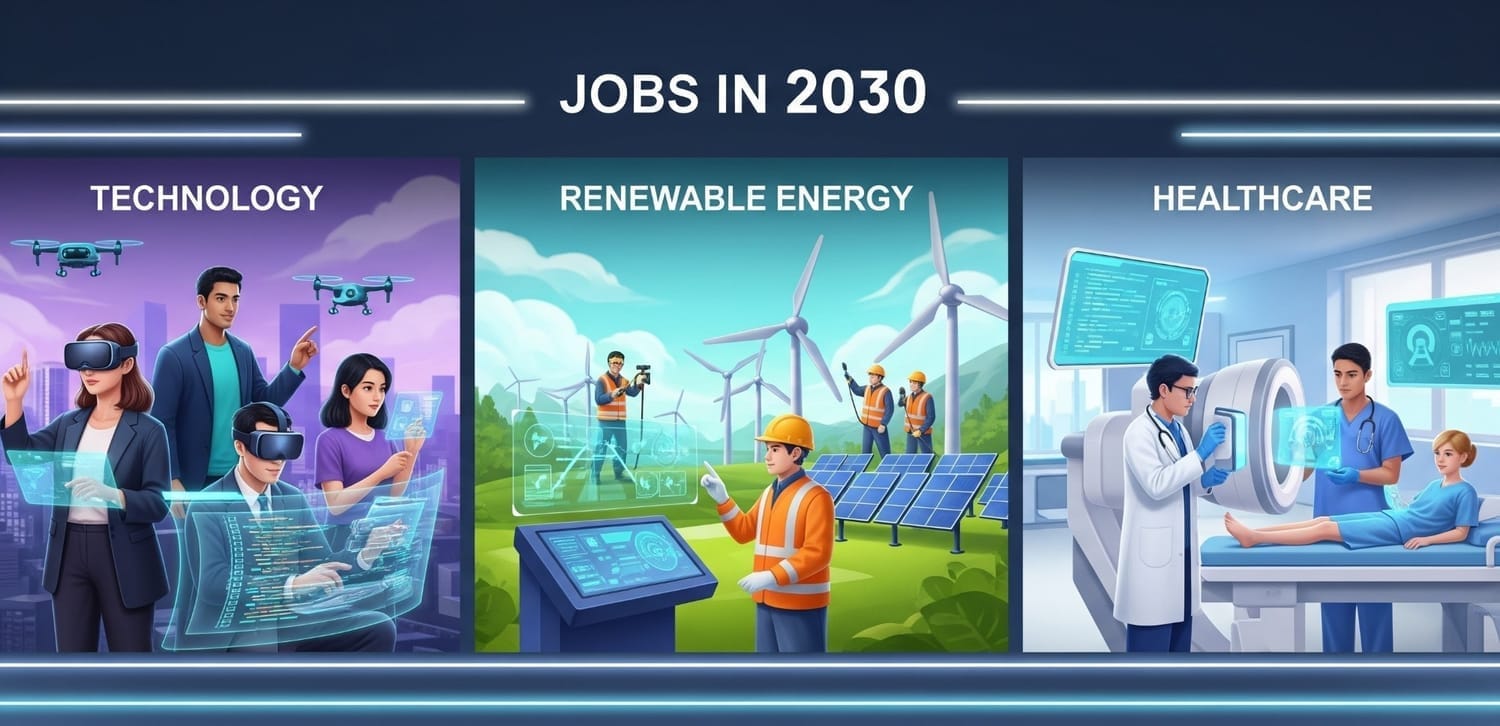Future Forward
Next Generation of thinkers and leaders meet here
Updated 01 Aug 2025
Jobs 2030: What Every Undergraduate Needs to Know

The job market in 2030 is projected to be significantly transformed by technological advancements, particularly in Artificial Intelligence (AI) and automation, alongside shifting global trends in the economy, demographics, and the green transition. While some jobs will be displaced, many new opportunities will emerge, leading to a net increase in jobs.
Here's a breakdown of what to expect:
1. Overall Job Market Trends:
Net Job Growth: The World Economic Forum's (WEF) "Future of Jobs Report 2025" predicts that by 2030, 170 million new jobs will be created while 92 million will be displaced, resulting in a net increase of 78 million jobs globally.
Skills Gap: A significant challenge will be the growing skills gap, with nearly 40% of skills required for jobs set to change. Upskilling and reskilling will be crucial.
Human-Machine Collaboration: The proportion of tasks carried out by humans, technology, and a blend of both is expected to become nearly equal by 2030. Many roles will involve working alongside AI tools and systems.
2. Fastest Growing Industries and Job Roles:
Technology, Data, and AI: This sector will continue to see rapid growth.
AI and Machine Learning Specialists
Data Scientists and Big Data Analysts
AI Research Scientists
Machine Learning Engineers
Big Data Architects
Business Intelligence Developers
Cybersecurity Specialists and Ethical Hackers
IoT & Intelligent Control Engineers
Blockchain Developers
Metaverse Content Developers, AR/VR Designers
Healthcare: Driven by an aging population and technological innovations.
Nursing Professionals and other care roles
Health Informatics Specialists
Wellness Coaches
Mental Health Therapists
Personalized Medicine & AI Healthcare Experts
Biotech Engineers, Genetic Editing & Cell Therapy Specialists
Renewable Energy & Environmental Technology: Global emphasis on combating climate change.
Renewable Energy Engineers (Solar, Wind, Hydrogen)
Carbon Management & Sustainability Experts
Environmental Engineers
Autonomous Vehicle Specialists
Education: As job markets evolve, lifelong learning and upskilling will be essential.
Secondary School Teachers
Higher Education Teachers
AI Tutoring System Developers
Frontline Roles: Despite automation, some core economy roles will see significant growth in absolute terms.
Delivery Drivers
Farmworkers
Construction Workers
Food Processing Workers
Other Emerging/Growing Industries:
Robotics and Automation (Robotics Engineers, Smart Manufacturing Specialists)
E-commerce and Digital Marketing (E-commerce & Omnichannel Business Specialists, Digital Marketing & AI Marketing Experts, Customer Experience Optimization Specialists)
Financial Technology (FinTech) (Decentralized Finance (DeFi) Experts, Digital Asset Investment Advisors)
Aerospace & Space Tourism (Aerospace Engineers, Space Travel Guides)
Food Technology & Alternative Proteins (High-Tech Food Engineers, Sustainable Food Development Specialists)
Cybersecurity & Data Protection
Transportation and Logistics (Sustainable transportation and logistics solutions)
Real Estate (with smart home technology and AI-based valuations)
Streaming Services
Human Resources Management
3. In-Demand Skills for 2030:
A blend of technological and human-centric skills will be crucial.
Technological Skills:
AI and Big Data
Networks and Cybersecurity
Technological Literacy (understanding how to use technology effectively)
Digital Communication Fluency & AI-Assisted Communication
Low and No-Code Software Development
Quantum Computing
Cognitive Skills:
Analytical Thinking
Creative Thinking
Complex Problem-Solving
Systems Thinking
Cognitive Flexibility & Contextual Adaptability
Human-Centric/Soft Skills:
Resilience, Flexibility, and Agility
Curiosity and Lifelong Learning
Leadership and Social Influence
Talent Management
Motivation and Self-Awareness
Empathy and Active Listening
Design and User Experience
Service Orientation and Customer Service
Entrepreneurial Agility & Opportunity Identification
Global Dexterity & Inclusive Collaboration
Strategic Thinking
Communication (clear, concise, persuasive across various platforms)
Relationship Building
4. Impact of AI:
Automation of Repetitive Tasks: AI will automate mundane tasks like data entry, scheduling, and standard reporting, freeing up humans for more strategic and creative work.
Augmentation of Existing Jobs: AI will often enhance existing roles rather than completely replace them, assisting professionals in diagnostics, analytics, and other areas.
Creation of New Jobs: AI will directly create new job opportunities in areas like AI development, management, and ethics.
Upskilling is Key: To thrive, individuals must learn to work alongside AI and develop skills that complement AI capabilities.
In essence, the job market in 2030 will require individuals who are adaptable, continuous learners, and possess a strong combination of technical prowess and uniquely human skills.
© 2025 Career Talks. All rights reserved.
Never miss an update again. Get personalized guidance, skill roadmaps, and industry insights in your inbox.
Check FAQ here
We empower YOU
Keep in touch
hello@careertalks.space
We empower YOU
Keep in touch
hello@careertalks.space



Terms of use
Privacy policy
Terms of use
Privacy Policy
